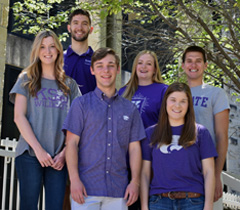May 12, 2017
Biochemistry and molecular biophysics majors achieve 100 percent acceptance to the University of Kansas School of Medicine
Submitted by Phillip E. Klebba

The biochemistry and molecular biophysics department reports that all of its undergraduate majors who applied to the 2021 class of the University of Kansas School of Medicine were accepted.
Matthew Brettmann and Natalie Ost were accepted through the Early Decision Program, which is an early application for the top students in Kansas who are committed to only attending the University of Kansas School of Medicine.
Mackenzie Wahl was accepted through the Scholars in Rural Health Program, which is a pre-admission program offered to students from rural areas in Kansas.
Samuel Broll, Tate Gilchrist and Garrison Olds were accepted through the traditional medical school application process.
All six of these seniors participated in the recently developed medical biochemistry track, which the department created in 2013 for its undergraduate students. This curriculum allows biochemistry students who desire a career in medicine or other health-related fields to both prepare for entrance exams and focus their classroom study on subject matter that will comprise their first year of medical, veterinary or nursing school. The medical biochemistry curricula contain more intensive foundations for molecular medicine than other majors, with requirements of taking medical biochemistry, immunology and a full year of graduate-level biochemistry. These curricula help set students apart from others in the applicant pool. Admissions committees now focus more on applicants with a firm grasp of the molecular underpinnings of human and animal health.
This year's K-State biochemistry and molecular biophysics acceptance rate is above 2016's overall acceptance rate for U.S. applicants to in-state medical schools, which was 60.6 percent.
Besides their heavy involvement in classroom learning, many of these students have contributed to ongoing research in biochemistry and molecular biophysics laboratories, including those of Brian Geisbrecht.
"It is quite an achievement these days for any student to get accepted to medical school in their first attempt, let alone an entire class of students from our department in that fashion," Geisbrecht said.
Timothy Durrett, research mentor of Olds, said, "This is a particularly good cohort of students. This is the first group I've known since they were freshmen; it's been rewarding to see them mature and succeed."
"These students are outstanding representatives of the biochemistry and molecular biophysics department and K-State," said Phillip E. Klebba, professor and head the department.
